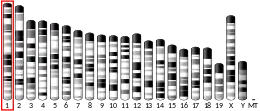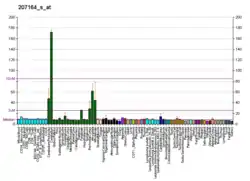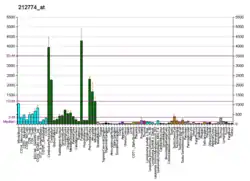Zinc finger protein 238 (also known as RP58 or ZBTB18) is a zinc finger containing transcription factor that in humans is encoded by the ZNF238 gene.[5][6]
Function
ZNF238 is a gene that plays a major role in the "promotion of ordered and correctly timed neurogenesis leading to proper layer formation and cortical growth."[7] The loss of ZNF238 has been observed to cause microcephaly, agenesis of the corpus callosum, malformation of layers in the cerebral cortex, and cerebellar hypoplasia.[7] Additionally, its absence can cause a decrease in Ngn2 and Neurod1 (in progenitor cells, and an increase thereof in mutant neurons), with the result of less progenitor cells and an increase in neuronal differentiation and glial cell growth.[7] ZNF238 also regulates repressed genes that, if left unchecked, can lead to glioma progression. Furthermore, an absence of ZNF238 results in upregulation of the epithelial-mesenchymal transition process.
In tumors such as medulloblastomas, the loss of ZNF238 can disorganize the tumor's cellular divisional processes, resulting in a cellularly diverse neoplasm. This new diversity has been observed to increase the invasiveness of the tumor, yielding proliferation into more areas of the brain than before the loss of ZNF238.
C2H2-type zinc finger proteins, such as ZNF238, act on the molecular level as transcriptional activators or repressors and are involved in chromatin assembly.[8]
Interactions
References
- 1 2 3 GRCh38: Ensembl release 89: ENSG00000179456 - Ensembl, May 2017
- 1 2 3 GRCm38: Ensembl release 89: ENSMUSG00000063659 - Ensembl, May 2017
- ↑ "Human PubMed Reference:". National Center for Biotechnology Information, U.S. National Library of Medicine.
- ↑ "Mouse PubMed Reference:". National Center for Biotechnology Information, U.S. National Library of Medicine.
- ↑ Becker KG, Lee IJ, Nagle JW, Canning RD, Gado AM, Torres R, Polymeropoulos MH, Massa PT, Biddison WE, Drew PD (November 1997). "C2H2-171: a novel human cDNA representing a developmentally regulated POZ domain/zinc finger protein preferentially expressed in brain". International Journal of Developmental Neuroscience. 15 (7): 891–9. doi:10.1016/S0736-5748(97)00034-8. PMID 9568537. S2CID 37032889.
- ↑ Aoki K, Ishida R, Kasai M (January 1997). "Isolation and characterization of a cDNA encoding a Translin-like protein, TRAX". FEBS Letters. 401 (2–3): 109–12. doi:10.1016/S0014-5793(96)01444-5. PMID 9013868. S2CID 46704829.
- 1 2 3 Xiang C, Baubet V, Pal S, Holderbaum L, Tatard V, Jiang P, et al. (April 2012). "RP58/ZNF238 directly modulates proneurogenic gene levels and is required for neuronal differentiation and brain expansion". Cell Death and Differentiation. 19 (4): 692–702. doi:10.1038/cdd.2011.144. PMC 3307985. PMID 22095278.
- ↑ "Entrez Gene: ZNF238 zinc finger protein 238".
- ↑ Fuks F, Burgers WA, Godin N, Kasai M, Kouzarides T (May 2001). "Dnmt3a binds deacetylases and is recruited by a sequence-specific repressor to silence transcription". The EMBO Journal. 20 (10): 2536–44. doi:10.1093/emboj/20.10.2536. PMC 125250. PMID 11350943.
Further reading
- Adams MD, Kerlavage AR, Fleischmann RD, Fuldner RA, Bult CJ, Lee NH, Kirkness EF, Weinstock KG, Gocayne JD, White O (September 1995). "Initial assessment of human gene diversity and expression patterns based upon 83 million nucleotides of cDNA sequence". Nature (PDF). 377 (6547 Suppl): 3–174. PMID 7566098.
- Becker KG, Nagle JW, Canning RD, Biddison WE, Ozato K, Drew PD (April 1995). "Rapid isolation and characterization of 118 novel C2H2-type zinc finger cDNAs expressed in human brain". Human Molecular Genetics. 4 (4): 685–91. doi:10.1093/hmg/4.4.685. PMID 7633419.
- Aoki K, Meng G, Suzuki K, Takashi T, Kameoka Y, Nakahara K, Ishida R, Kasai M (October 1998). "RP58 associates with condensed chromatin and mediates a sequence-specific transcriptional repression". The Journal of Biological Chemistry. 273 (41): 26698–704. doi:10.1074/jbc.273.41.26698. PMID 9756912.
- Ahmad KF, Engel CK, Privé GG (October 1998). "Crystal structure of the BTB domain from PLZF". Proceedings of the National Academy of Sciences of the United States of America. 95 (21): 12123–8. Bibcode:1998PNAS...9512123F. doi:10.1073/pnas.95.21.12123. PMC 22795. PMID 9770450.
- Meng G, Inazawa J, Ishida R, Tokura K, Nakahara K, Aoki K, Kasai M (January 2000). "Structural analysis of the gene encoding RP58, a sequence-specific transrepressor associated with heterochromatin". Gene. 242 (1–2): 59–64. doi:10.1016/S0378-1119(99)00477-1. PMID 10721697.
- Fuks F, Burgers WA, Godin N, Kasai M, Kouzarides T (May 2001). "Dnmt3a binds deacetylases and is recruited by a sequence-specific repressor to silence transcription". The EMBO Journal. 20 (10): 2536–44. doi:10.1093/emboj/20.10.2536. PMC 125250. PMID 11350943.
External links
- ZNF238+protein,+human at the U.S. National Library of Medicine Medical Subject Headings (MeSH)
This article incorporates text from the United States National Library of Medicine, which is in the public domain.





